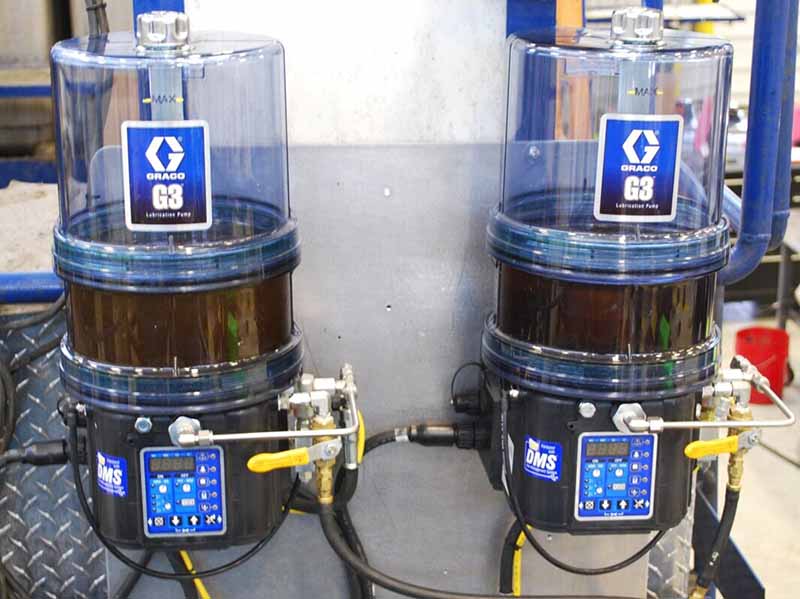Lubrication Systems
Our range of lubrication systems offers reliable and efficient solutions for delivering the right amount of lubricant to the right components at the right time.
- Home
- Products
- Rolling Mill Solutions
- Lubrication Systems
Our Products
Let’s Start Work
Together
Please feel free to contact us. We will get back to you with 1-2 business days. or just call us now.

Lubrication Systems Overview
Lubrication systems play a critical role in the steel manufacturing industry by providing effective lubrication and ensuring the smooth operation of various equipment and machinery. Our range of lubrication systems offers reliable and efficient solutions for delivering the right amount of lubricant to the right components at the right time. These systems help minimize friction, reduce wear and tear, extend equipment life, and optimize operational performance.
Key Components of Lubrication Systems
Centralized Lubrication Units
Centralized lubrication units serve as the core of lubrication systems, providing a centralized and automated approach to lubrication. These units consist of pumps, reservoirs, filters, valves, and control devices that work together to supply lubricant to multiple lubrication points.
Lubricant Delivery Systems
Lubricant delivery systems, such as grease or oil circulation systems, distribute lubricants to various equipment and machinery components. These systems use pipelines, fittings, and dispensing devices to deliver lubricants precisely and efficiently to lubrication points.
Lubricant Monitoring and Control
Lubrication systems often incorporate sensors, gauges, and monitoring devices to measure lubricant levels, flow rates, and system performance. Control devices, such as timers or programmable controllers, regulate the frequency and duration of lubrication cycles to optimize lubricant usage.
Filtration and Conditioning
Lubrication systems include filtration and conditioning mechanisms to ensure the cleanliness and quality of the lubricants. Filters and separators remove contaminants, such as dirt, debris, or moisture, from the lubricant, enhancing equipment reliability and performance.
Application
Rolling Mills
Lubrication systems are widely used in rolling mills to provide lubrication to bearings, gears, and other moving parts. They reduce friction and wear, prevent overheating, and ensure smooth operation during the rolling process.
Conveyors & Material Handling Equipment
Lubrication systems are essential for maintaining the efficiency and reliability of conveyors and material handling equipment. They lubricate chains, rollers, bearings, and other components, reducing friction and preventing premature wear and breakdowns.
Gearboxes and Reducers
Lubrication systems play a crucial role in ensuring the proper lubrication of gears, gearboxes, and reducers. They provide a consistent supply of lubricant to protect gears from wear, reduce noise, and maintain efficient power transmission.
Bearings and Slides
Lubrication systems are used to lubricate bearings and slides in various equipment, such as motors, pumps, and hydraulic systems. They minimize friction, reduce heat generation, and extend the service life of these components.
Continuous Casting Machines
Lubrication systems are utilized in continuous casting machines to lubricate molds, rollers, and other critical components. They ensure smooth and precise movement of the molten steel, preventing sticking or surface defects during the casting process.
Furnaces & Heat Treatment Equipment
Lubrication systems are employed in furnaces and heat treatment equipment to lubricate furnace doors, rollers, and other movable parts. They enhance the performance, efficiency, and longevity of these high-temperature equipment.
Benefits of Lubrication Systems
Reduced Friction and Wear
Lubrication systems minimize friction and wear between moving parts, extending the lifespan of equipment and reducing maintenance costs.
Increased Equipment Lifespan
Lubrication systems protect critical components from corrosion, oxidation, and excessive heat, thereby extending the lifespan of equipment.
Improved Energy Efficiency
Efficient lubrication reduces energy consumption by minimizing friction and optimizing the operation of machinery, resulting in energy savings.
Enhanced Safety
Proper lubrication reduces the risk of equipment failure, malfunctions, and accidents, ensuring a safe working environment for operators and maintenance personnel.
Maintenance Optimization
Lubrication systems automate the lubrication process, reducing the need for manual lubrication and streamlining maintenance activities. This leads to improved maintenance efficiency, reduced downtime, and lower maintenance costs.
Environmental Considerations
Lubrication systems help minimize the environmental impact by preventing leaks, spillage, and excessive lubricant usage. They ensure precise lubricant application, reducing wastage and promoting environmental sustainability.
In summary, our range of lubrication systems provides reliable and efficient solutions for the steel manufacturing industry. These systems deliver the right amount of lubricant to critical components, reducing friction, wear, and the risk of equipment failure. By optimizing equipment performance, extending equipment lifespan, and improving energy efficiency, our lubrication systems contribute to the overall productivity, reliability, and safety of steel manufacturing operations. We are committed to providing high-quality lubrication systems tailored to the specific needs and requirements of our customers, ensuring smooth and trouble-free operation of their equipment.

